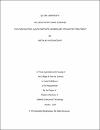Polymer-Matrix Nanocomposite Membranes For Water Treatment
Abstract
A new generation of advanced fibrous materials with high surface area, large number of pores, high flexibility and adjustable wettability were manufactured from different materials which are viable for many applications related to environment especially oil water separation.
This thesis is focused on the preparation and characterization of two new different polymeric systems applicable in water/oil separation and oil impurities detection. The material system for sensor development is based on styrene isoprene styrene (SIS) elastomer filled with multiwalled carbon nanotubes and system for water/oil separation is composed by co-polyamide (coPA) electrospun mat covered by MXene sheets.
Preparation of composites based on styrene isoprene styrene block polymer (SIS) modified by carbon nanotubes (CNTs) involves optimization of the component ratio and processing conditions utilizing electrospinning method. SIS has ability to absorb oil due to its oleophilic behavior and CNTs enhance the electrical conductivity of composite. The principle of oil sensing is based on the changes of electrical conductivity because of volumetric changes of material due to oil absorption.
Separation of oil from water is performed using membrane technology. We prepared coPA mats via optimization of the polymer solvent/ratio conditions using electrospinning technique. MXene nanoplatelets were prepared from commercial MAX phase by strong etching with HF and delamination.
CoPA mats covered by MXene nanoparticles and this bilayer system was used for water/oil separation. The separation efficiency up to 99.5% which indicates that it is valuable material for separation oil from water.
DOI/handle
http://hdl.handle.net/10576/11865Collections
- Materials Science & Technology [68 items ]


